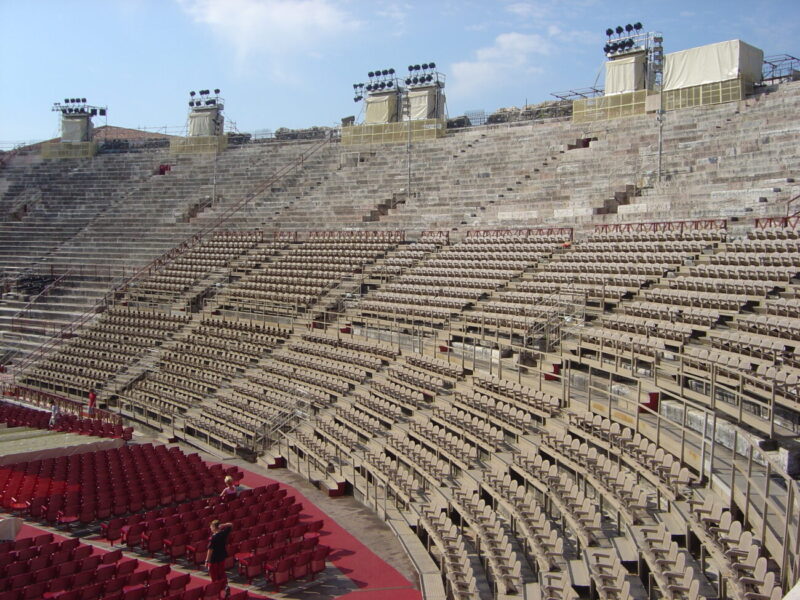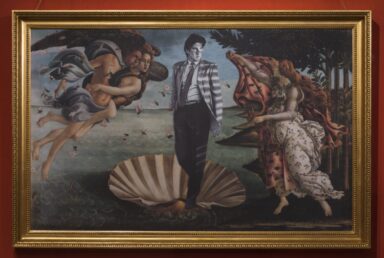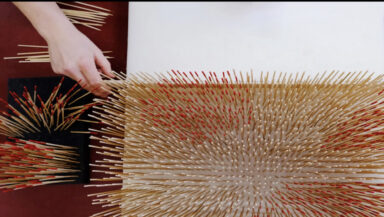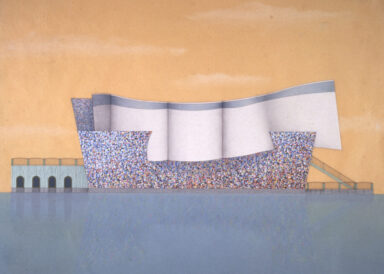Built in 30 AD and nestled within the historical edges of L’Arena amphitheatre, once again the new Opera Festival unleashes marvels – and wonders
It’s been a wild ride for the global creative community that seemingly has no end in sight. But despite a pandemic (that shall not be named), there’s nothing like one lone empty seat on a stage to get the brain firing on all cylinders. Well, that’s if you’re like me and can’t get weary of a Top DSharp in one of the world’s most compelling, dramatic arias of all times. A thrilling anticipation that became so very real in the minutes leading up to the start of L’Arena di Verona’s Verdi show, La Traviata, part of the 2022 Opera Festival edition, which exemplified the composer’s excellence both technically and sonically—performed in a setting like no other. As for the soaring high notes and perfect acoustics? There’s more to the story. “The Arena di Verona is one of the best-preserved and largest amphitheatres in the Roman world, and today the largest open-air opera house in the world,” opins Marco Armiliato, Musical Director of the 2022 Festival. “The pervasive fascination of this monument, its pink stone, its structure designed to welcome the audience in a circular embrace, a wonderful, round stone, designed in this way so that it could reflect sound. The pink stone that also characterises the entire Piazza Brà and the surrounding portico creates a very special, unique visual continuity, as does its dialoguing with the tourists and inhabitants of the city in a relationship almost of osmosis and interpenetration. It is an emotional and sacred beauty.” On the key downturn encountered when conducting the performance, he continues, “is certainly a great challenge and is very demanding especially when working in an outdoor arena. It is very important to guarantee a homogeneous sound, a harmony between the mystic gulf and the stage, which is why rehearsals are crucial and vital to the success of the show.” This year, the 99th Arena di Verona Opera Festival will present a total of 46 unique nights in the name of Opera, with its imposing shows and the best international soloists across the music spectrum. And whilst cheap praises can often be a dangerous thing, the greatest Operatic classics are sure not to disappoint: from Bizet’s Carmen to Verdi’s Aida and La Traviata, Puccini’s Turandot and Orff’s Carmina Burana (on from August 12th, 2022), this season’s programme presents a wealth of feel-good picks for the taking. “The 99th Arena di Verona Opera Festival confirms the return of great productions to this stage,” adds Stefano Trespidi, Deputy Artistic Director of the Fondazione, “and features an absolutely prestigious international cast. We have worked a lot and are still working hard to ensure that spectators who flew from all over the world find that special magic in every one of the Festival’s 46 nights.” A special sentiment that echoed ever beautifully–and masterfully—in Verdi’s operatic stanzas, that of La Traviata. The iconic storytelling was punctuated by equally iconic moments across all three acts: from Nina Minasyan’s phenomenal register in Sempre Libera (Act1) to the final scene in the third act before she passes away (while staging up the role of Violetta Valery), La Traviata’s performance at L’Arena di Verona was no mean feat; however, it featured a mesmerising take on costumes and poignant drama, reflecting Verdi’s contemporary grounding and effect on modern-day society. La Traviata is part of the artistic maturity of Verdi, aware of his ability and willing to challenge the society of his time by staging subjects in which he believed. That felt brazen across the entire opera. Like Stiffelio and Rigoletto, Violetta’s story, taken from the play and novel by Dumas fils (who in turn was inspired by the real Alphosine/Marie Duplessis), also had to fight the censorship of the period and a reception that was not always unanimous: not so much for a melodic invention and “dramatic hue”, among Verdi’s most inspired for the revolutionary unity of style, but for the difficulty on behalf of spectators to see their (few) virtues and vices represented on stage. It goes without saying that La Traviata’s potent performance felt ever so brilliant not only from a vocal standpoin, but it had a sheer resonance with today’s world that stops one in his tracks. Be it the love-hate relationship between the characters, the clever usage of face masks by a small amount of actors and the deliberate willingness to unfold a story of grief and joy: it reflected the vortex of seismic turbulence which affects humans in this day and age, which isn’t limited to the classical depiction of an opera but relates to us all. All in all, it feels like an important time to engage substantively with Opera, but at the same time, in Italy there is so much baggage when it comes to looking at the art of classics, that the lens itself feels somewhat compromised. La Traviata’s historical and modern resonance has a silver-lining after all: to live and feel free. So there it is, a jug filled with culture to bypass the downturns of our world. Cheers to that.



